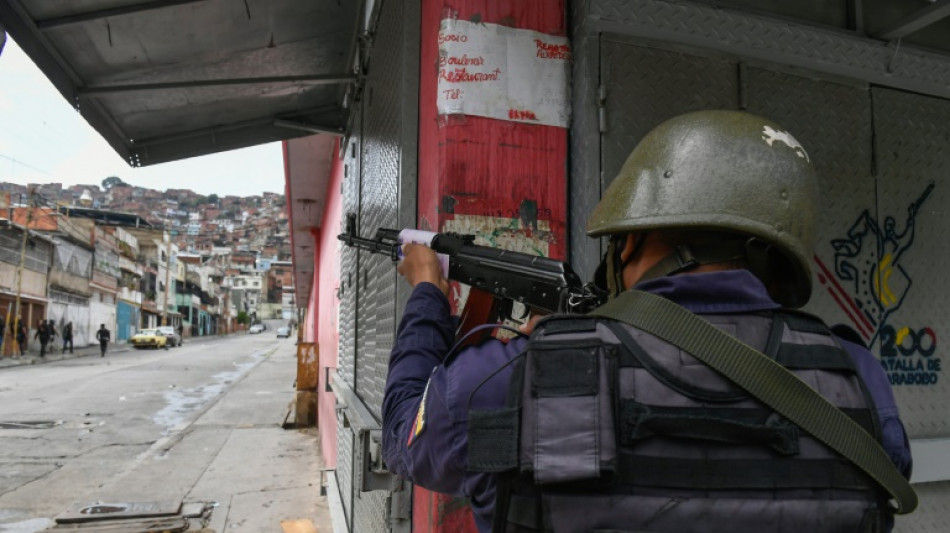
-
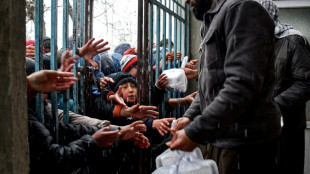 Millions of children to suffer from Trump aid cuts
Millions of children to suffer from Trump aid cuts
-
Veteran Wallaby Beale set for long-awaited injury return
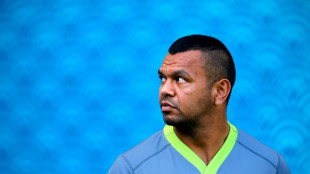
-
 Syria's Druze take up arms to defend their town against Islamists
Syria's Druze take up arms to defend their town against Islamists
-
Tesla sales plunge further in France, down 59% in April

-
 US calls on India and Pakistan to 'de-escalate'
US calls on India and Pakistan to 'de-escalate'
-
Israel reopens key roads as firefighters battle blaze

-
 Europe far-right surge masks divisions
Europe far-right surge masks divisions
-
James will mull NBA future after Lakers playoff exit

-
 Ukraine's chief rabbi sings plea to Trump to side with Kyiv
Ukraine's chief rabbi sings plea to Trump to side with Kyiv
-
Australian mushroom meal victim 'hunched' in pain, court hears

-
 Lakers dumped out of playoffs by Wolves, Rockets rout Warriors
Lakers dumped out of playoffs by Wolves, Rockets rout Warriors
-
Booming tourism and climate change threaten Albania's coast

-
 US reaching out to China for tariff talks: Beijing state media
US reaching out to China for tariff talks: Beijing state media
-
Tariffs prompt Bank of Japan to lower growth forecasts

-
 Kiss faces little time to set Wallabies on path to home World Cup glory
Kiss faces little time to set Wallabies on path to home World Cup glory
-
Serbian students, unions join forces for anti-corruption protest

-
 Slow and easily beaten -- Messi's Miami project risks global embarrassment
Slow and easily beaten -- Messi's Miami project risks global embarrassment
-
Fan in hospital after falling to field at Pirates game

-
 Nuclear power sparks Australian election battle
Nuclear power sparks Australian election battle
-
Tokyo stocks rise as BoJ holds rates steady

-
 Bank of Japan holds rates, lowers growth forecasts
Bank of Japan holds rates, lowers growth forecasts
-
'Sleeping giants' Bordeaux-Begles awaken before Champions Cup semis

-
 Napoli eye Scudetto as Inter hope for post-Barca bounce-back
Napoli eye Scudetto as Inter hope for post-Barca bounce-back
-
Germany's 'absolutely insane' second tier rivalling Europe's best

-
 PSG minds on Arsenal return as French clubs scrap for Champions League places
PSG minds on Arsenal return as French clubs scrap for Champions League places
-
UK WWII veteran remembers joy of war's end, 80 years on

-
 Myanmar junta lets post-quake truce expire
Myanmar junta lets post-quake truce expire
-
Rockets romp past Warriors to extend NBA playoff series

-
 Messi, Inter Miami CONCACAF Cup dream over as Vancouver advance
Messi, Inter Miami CONCACAF Cup dream over as Vancouver advance
-
UN body warns over Trump's deep-sea mining order

-
 UK local elections test big two parties
UK local elections test big two parties
-
US judge says Apple defied order in App Store case

-
 Seventeen years later, Brood XIV cicadas emerge in US
Seventeen years later, Brood XIV cicadas emerge in US
-
Scorching 1,500m return for Olympic great Ledecky in Florida

-
 Israel's Netanyahu warns wildfires could reach Jerusalem
Israel's Netanyahu warns wildfires could reach Jerusalem
-
Istanbul lockdown aims to prevent May Day marches

-
 Formation Metals Announces Appointment of Adrian Smith to Advisory Committee
Formation Metals Announces Appointment of Adrian Smith to Advisory Committee
-
Cerrado Gold Announces Q4 And Annual 2024 Financial Results

-
 Australian guard Daniels of Hawks named NBA's most improved
Australian guard Daniels of Hawks named NBA's most improved
-
Mexico City to host F1 races until 2028

-
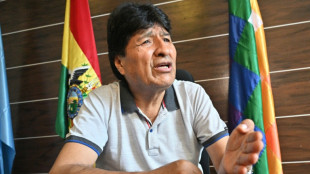 Morales vows no surrender in bid to reclaim Bolivian presidency
Morales vows no surrender in bid to reclaim Bolivian presidency
-
Ukraine, US sign minerals deal, tying Trump to Kyiv
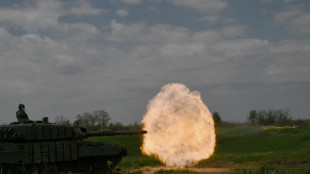
-
 Phenomenons like Yamal born every 50 years: Inter's Inzaghi
Phenomenons like Yamal born every 50 years: Inter's Inzaghi
-
Ukraine, US say minerals deal ready as Kyiv hails sharing
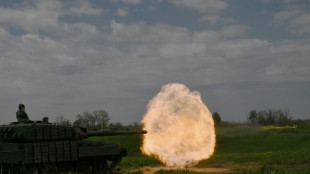
-
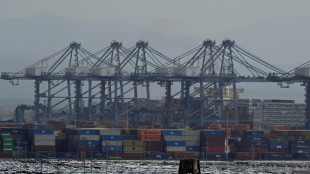 Global stocks mostly rise following mixed economic data
Global stocks mostly rise following mixed economic data
-
O'Sullivan says he must play better to win eighth snooker world title after seeing off Si Jiahui
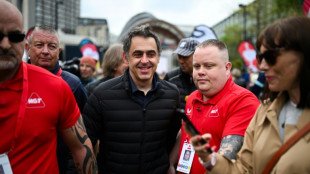
-
 Sabalenka eases past Kostyuk into Madrid Open semis
Sabalenka eases past Kostyuk into Madrid Open semis
-
Netflix's 'The Eternaut' echoes fight against tyranny: actor Ricardo Darin
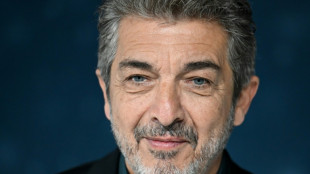
-
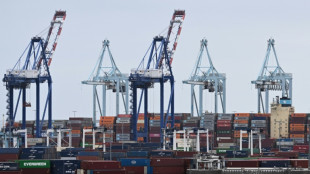 US economy unexpectedly shrinks, Trump blames Biden
US economy unexpectedly shrinks, Trump blames Biden
-
Barca fight back against Inter in sensational semi-final draw


'Aragua train': Venezuela's fearsome crime syndicate exposed in book
Extortion, prostitution, murder, drug trafficking, people smuggling: Venezuela's "Tren de Aragua" went from gang to multinational syndicate in a matter of years -- a rise that journalist Ronna Risquez documented in a new book endangering her life.
The gang, which emerged in Tocoron prison in the northern state of Aragua in 2014, today boasts a force of some 5,000 men, according to the reporter who spent three years investigating the subject.
The prison today is in the hands of the gang; police relegated to the outside, she says.
"On the inside, the men I saw with firearms were prisoners who belong to the organization," Risquez told AFP in Caracas. "The National Guard is outside, at the entrance."
The prison might as well be a resort hotel for gang leaders. It boasts not just a pool but also a zoo, a betting room, a bank, a baseball field and even a nightclub called "Tokio", where artists perform and invited celebrities visit.
The gang cover the overheads, Risquez said, by extorting millions.
Each prisoner pays a fee of about 15 dollars a week -- that is 3.5 million dollars a year, she explained.
Anyone who fails to pay are forced to sleep outdoors and given little or nothing to eat.
Finances are managed by gang leader Hector Guerrero Flores, known as "Nino Guerrero" (Kid Warrior), according to the author.
Serving a 17-year sentence for murder and drug trafficking, among other crimes, Guerrero appears to come and go as he pleases -- sometimes enjoying Venezuelan beaches on a yacht, Risquez's investigation found.
The prison serves as his base, where he is protected by an army of inmates on his payroll.
- Now beyond borders -
The "Aragua Train" gang at first engaged in "classic" mafia activities: kidnappings, robberies, drugs, prostitution and extortion before graduating to illegal gold mining in a country with some of the largest deposits in the world, Risquez said.
Its tentacles, which also extend to legal businesses, stretch to the remote town of Las Claritas, in the mining state of Bolivar in Venezuela's southeast, where it controls everything from shops to health services.
The gang has also taken advantage of Venezuela's unprecedented economic and emigration crisis to put down roots in at least eight other Latin American countries, the author says.
"Among the seven million Venezuelans who left the country, there are members of criminal groups who no longer had anyone left to kidnap, rob... The gang identified a criminal business opportunity in this emigration," she explained.
The "Aragua Train" gang jumped right in with Latin America's human traffickers known as coyotes and manages prostitution networks with Venezuelans in Peru, Ecuador and Chile.
On emigration routes, it attracts new members in precarious situations and with few alternatives, said Risquez.
In Brazil, the gang entered into an "alliance with the main armed group, the PCC" -- the First Command of the Capital, a group originally from Sao Paulo also born in a prison -- around arms sales and prostitution, she added.
"It is impossible to read the book without wondering how the development of such a criminal organization is possible without the complicity of the Venezuelan State," publisher Sergio Dabhar states on the cover of the book he was forced to print in secret.
Dabhar is in negotiations for the translation of the work into other languages.
"The book presents different risks for the author," said Luis Moreno Ocampo, former prosecutor of the International Criminal Court in the Hague -- urging that her sacrifice not be ignored.
"Our challenge is to turn this book into a lever for change," he stressed.
Risquez has received several death threats since the work's release last week.
H.E.Young--AMWN